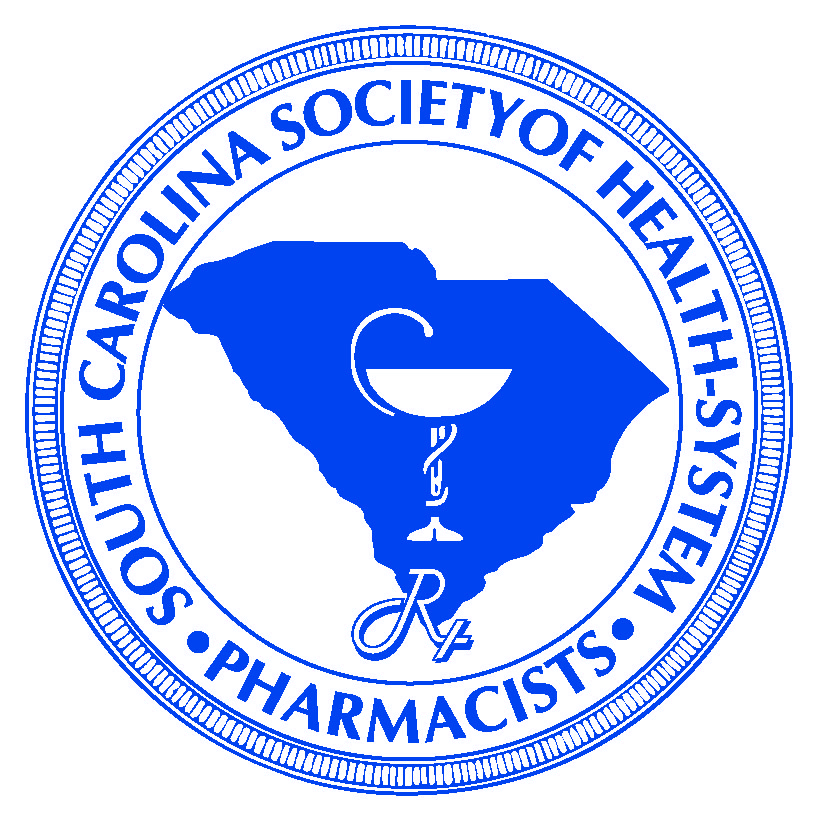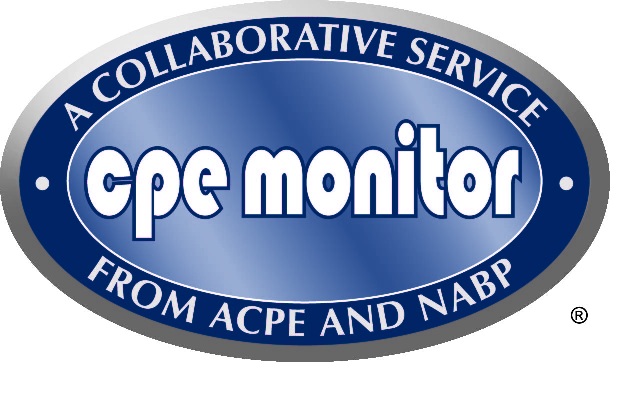
Date: Mar 3, 2021 03:30 PM - Mar 5, 2021 03:30 PM
CE Hours
CE Units
Activity Type
- Knowledge-Based and Application-Based
Target Audience(s)
- Pharmacists
- Pharmacy Technicians
Accreditation(s)

|
The University of South Carolina College of Pharmacy is accredited by the Accreditation Council for Pharmacy Education as a provider of continuing pharmacy education.
|
Co-Sponsor(s)
Requirements for CE Credit
- Check in upon arrival at the meeting
- Complete and submit the "CE Sign In" form at the meeting
- Complete the online program evaluations
- Provide the correct month and day of birth and NABP e-Profile ID. Registration with a proper disclosure of your NABP E-Profile ID is a requirement for receiving Continuing Pharmacy Education. To register with or look up your NABP e-Profile ID, please click on the CPE Monitor logo below to be directed to their site.
- Recall pharmacy trivia related to pharmacology, pharmacokinetics, pharmacodynamics, pharmacogenomics, clinical pharmacy history, biostatistics, and health outcomes
- Summarize clinical knowledge in response to a case vignette using supporting laboratory, physical examination, and medical history information
- Discuss numerous drug therapy and specialty areas through response to pharmacotherapy questions
Speaker(s)/Author(s)
|
Jason S. Haney, PharmD, BCPS, BCCCP
|
|
|
Whitney Maxwell, PharmD, MBA, BCPS
|
Activity Number
0062-9999-21-014-L01-P/TCE Hours
- Discuss emerging research outcomes from throughout the state of South Carolina
- Recognize novel ideas for research and quality initiative projects in your pharmacy practice areas
- Review pivotal results from local investigations across the state of South Carolina
Speaker(s)/Author(s)
|
Abigail Will, PharmD, CDCES
|
|
|
Sarah Bruner
|
|
|
Zachariah Gunter, PharmD
|
Activity Number
0062-9999-21-015-L04-P/TCE Hours
- Recall pharmacy trivia related to pharmacology, pharmacokinetics, pharmacodynamics, pharmacogenomics, clinical pharmacy history, biostatistics, and health outcomes
- Summarize clinical knowledge in response to a case vignette using supporting laboratory, physical examination, and medical history information
- Discuss numerous drug therapy and specialty areas through response to pharmacotherapy questions
Speaker(s)/Author(s)
|
Jason S. Haney, PharmD, BCPS, BCCCP
|
|
|
Whitney Maxwell, PharmD, MBA, BCPS
|
Activity Number
0062-9999-21-016-L01-P/TCE Hours
- Describe the prevalence of and implications associated with pharmacist and pharmacy technician burnout
- Identify risk factors and symptoms of burnout in ourselves and other healthcare team members
- Discuss resources and strategies to help manage burnout, with a focus on the COVID-19 pandemic
- Develop a plan that can be implemented by pharmacists and pharmacy technicians to help minimize burnout and increase resiliency
Speaker(s)/Author(s)
|
Amy Hebbard, PharmD, BCPP
|
|
|
Sarah Harrison, PharmD, BCCCP
|
Activity Number
0062-9999-21-017-L04-P/TCE Hours
- Discuss existing pharmacotherapy recommendations for the management of emergent status epilepticus
- Describe current clinical practice in the pre-hospital and hospital settings
- Interpret current evidence and its potential impact on clinical practice variations
- Identify opportunities to ensure optimal dosing and timing of antiepileptic medications in the pre-hospital and hospital setting based on current recommendations
- Hypothesize areas for future exploration in the pharmacotherapy management of emergent status epilepticus
- Identify emergently needed pharmacotherapy agents for the management of status epilepticus
- Interpret the importance of time in the implementation of pharmacotherapy in the management of status epilepticus
Speaker(s)/Author(s)
|
Kyle Weant, PharmD, BCPS, BCCCP, BCEMP, FCCP
|
Activity Number
0062-9999-21-018-L01-P/TCE Hours
- Explain current state and federal requirements for reporting diversion concern and loss of controlled substances
- Discuss with their institution the key components required for a multi-disciplinary Drug Diversion Committee and Diversion Response Team
- Review different patient care area types and identify areas of vulnerability
- Recognize and report possible concerns relating to controlled substance security within the pharmacy and on nursing units
- Investigate and appropriately respond to issues encountered at the Automated Dispensing Cabinets
Speaker(s)/Author(s)
|
Bethanie Gamble, PharmD
|
Activity Number
0062-9999-21-019-L03-P/TCE Hours
- Review common goals and barriers faced by early-career practitioners
- Illustrate the importance of early-career mentorship as a foundation for prolonged personal and professional growth
- Identify opportunities for seasoned practitioners to expand their mentorship skills and support network
- Summarize experiences of a panel of diverse early-career practitioners and seasoned mentors as real-world examples of the impact of early-career mentorship
Speaker(s)/Author(s)
|
Brandon Hill, PharmD, BCIDP, BCPS
|
|
|
Krutika N. Mediwala, PharmD, BCPS, BCIDP
|
Activity Number
0062-9999-21-020-L04-P/TCE Hours
- Describe pharmacist requirements in the South Carolina Overdose Prevention Act for the dispensing of naloxone without a prescription or standing order
- Identify ways for pharmacists and technicians to reduce stigma and communication barriers when providing opioid overdose education, including the proper use of naloxone.
- Demonstrate the value of utilizing academic detailing principles in student-led interventions to engage pharmacists in practice behavior changes that aid in the expansion of access to naloxone
Speaker(s)/Author(s)
|
Elizabeth Weed, MSW, PharmD, BCPP
|
|
|
Megan Pruitt, PharmD
|
|
|
Talisha Ratliff, PharmD
|
Activity Number
0062-9999-21-021-L08-P/TCE Hours
- Define asymptomatic bacteriuria (ASB) and urinary tract infection (UTI)
- Differentiate between ASB and UTI in a complicated clinical case
- Design an appropriate treatment regimen for patients with complicated UTIs, including agent selection, dose, and duration
- Define asymptomatic bacteriuria (ASB) and urinary tract infection (UTI)
- Recall differences in management of ASB and UTIs
- Identify pharmacotherapy agents used in the treatment of complicated UTIs
Speaker(s)/Author(s)
|
Rachel Britt, PharmD, BCIDP
|
Activity Number
0062-9999-21-022-L01-P/TCE Hours
- Describe how to identify and manage a drug shortage
- Demonstrate how pharmacy staff are uniquely positioned to identify and solve drug supply shortages
- Recognize how pharmacists must communicate effectively with other healthcare professionals to efficiently manage shortages
- Demonstrate how use of pharmacy information systems aid in the identification and management of drug shortages
- Describe the pharmacy technician role in maintaining accurate stock of pharmaceutical inventory
- Recognize the pharmacy technician role in mitigating shortages using multiple strategies
Speaker(s)/Author(s)
|
Amy Schaefer, PharmD
|
|
|
Chloé LeBegue, PharmD
|
Activity Number
062-9999-21-023-L04-P/TCE Hours
- Summarize treatment recommendations from the American Diabetes Association and American College of Clinical Endocrinology for type 2 diabetes (T2D)
- Given a patient case, assess the benefits and risks of glucagon-like peptide-1 receptor agonists, as a first-line option, for a person with T2D
- Given a patient case, assess the benefits and risks of sodium glucose co-transporter-2 inhibitors, as a first-line option, for a person with T2D
- Describe the role of glucagon-like peptide-1 receptor agonists (GLP-1 RA) and sodium glucose co-transporter-2 inhibitors (SGLT2i) for type 2 diabetes (T2D)
- Identify a benefit and risk of GLP-1 RA, as a first-line option, for a person with T2D
- Identify a benefit and risk of SGLT2i, as a first-line option, for a person with T2D
Speaker(s)/Author(s)
|
Jennifer Clements, PharmD, FCCP, FADCES, BCPS, CDCES, BCACP, BC-ADM
|
|
|
Sarah Anderson, PharmD, FCCP, FASHP, BCPS, BCACP
|

